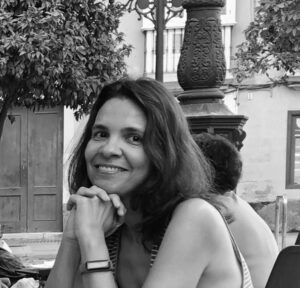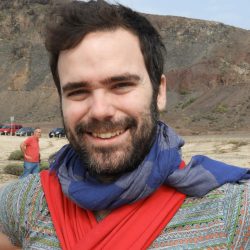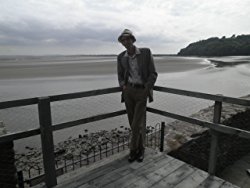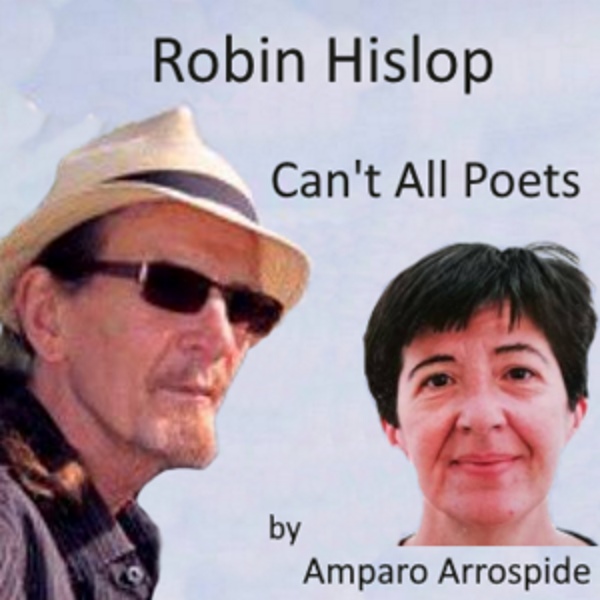This poetry reading was performed in Spanish on May 6th in Madrid Spain presenting Amparo Arróspide’s award winning poetry book, title as seen above, accompanying her in the presentation and reading were Noni Benegas, Javier Gil, Angel Huerga and Oscar Ouzman. The illustrations to the book were made by artist Asem Navaro & the video was made by Robin Ouzman Hislop
Amparo Arróspide
Six Poems from EL PLAZO (THE DEADLINE) by Olga Muñoz. Translated by Amparo Arrospide and Robin Ouzman Hislop
Six poems from EL PLAZO (THE DEADLINE)
16.
Desapareceríamos todos si las abejas murieran. Por ahora somos cuatro: dos adultos y dos crías que cargar en brazos en caso necesario. Pronostican una marcha tranquila, aunque el zumbido nos alcance en las próximas jornadas. Como alimento llevamos la oscura miel de la familia, indigesta, dulzona. Los nuevos evitamos derramarla, ya que una gota perdida trae la maldición de confundir las criaturas propias. Sin olerla llegó el animalillo de nombre equivocado, en medio del camino.
16.
Were bees to die, we would all disappear. Right now we are just four: two adults and two cubs to carry in our arms if necessary. In spite of the buzz reaching us in the next few days, a peaceful march is predicted. We carry as food for the family our dark sickly sweet indigestible honey. As the newly arrived we take care not to spill a drop as a drop lost would curse us into confusing our own offspring. Not smelling the honey, a little animal with a wrong name appeared into the middle of the road.
17.
Volvemos a casa con la cría y el espacio se ha hecho redondo. Las elásticas paredes ceden a nuestras voces. Parece que el hueco estaba listo desde hace meses, pues cada objeto ocupa su espacio densamente. Sólo a la llegada nos percatamos. Despacio penetramos el aire, conseguimos traspasarlo para cobijar a los nuestros.
17.
We return home with the cub into a space that has become round. The elastic walls recede with our voices. It seems the vacuity had been prepared for months, as each object occupies its own dense space. Only after arrival do we realize it as we slowly penetrate the air and manage to cross it to find a shelter for our own.
18.
No rodará, no caerá al vacío. No lo abrazará el aire, continente escueto al principio, península improvisada, isla final. Como en los trucos de magia, existen hilos invisibles, saliva que me ata a tres cuerpos y hace de mí una marioneta ciega.
18.
It will not roll nor fall into a void nor embrace the air, a bare continent at the beginning, an improvised peninsula, an island at the end. As with tricks of magic, invisible threads exist, saliva that ties me to three bodies like a blind marionette.
19.
Cada uno aguarda su turno para respirar. No nos vemos siquiera. Ocupamos salas de cristal con cuerpos transparentes, reflejados al azar. La gran mentira, el espejismo del aire. Mientras, las crías dormitan en la madriguera, repleta de oxígeno su sangre recién nacida.
19.
We each wait for our turn to breathe. We can’t even see each other. Our transparent bodies occupy glass rooms, randomly reflected. The mirage of air, a great lie. Meanwhile, the cubs are dozing snuggled close, their newborn blood full of oxygen.
20.
Escucha a su madre leer un cuento, la historia que lo espera al otro lado. Aún lo separan unos centímetros del designio. Un jabalí descompuesto en el bosque recuerda a ese niño alumbrado a la muerte. El deseo repetido de luna en luna, la tristeza rojiza del vacío. Mujer estéril que sueña al hijo con solo apartar la mano a tiempo.
20.
He listens as his mother reads a story, a story that waits for him from the other side. Yet still a few centimeters separate him from his fate. A rotting boar in the forest resembles the birth of the child born to death. The same desire passed from moon to moon, the reddish sadness of emptiness. A barren woman who dreams her son with only the withdrawal of her hand on time.
21.
Encontraste el sedal entre la arena, lejos del lugar del sacrificio. Casi caíste, y con todo tu cuerpo –uñas, árbol, océano– preguntabas qué era ese hilo. Te dimos palabras precisas, las más adecuadas seguramente. Nos pierde la exactitud. Aún así, siguen muriendo los peces de asfixia, con ese mismo sedal de tus dedos.
21.
You found the fishing line in the sand, far from the place of sacrifice. You almost fell down, and with your whole body – nails, tree, ocean – asked what was that thread. We replied with precise words, surely the most adequate. Exactitude is our undoing. But still fish continue to die of suffocation, with that same thread from your fingers.
Olga Muñoz Carrasco is author of the books: La caja de música (Madrid, Fundación Inquietudes/Asociación Poética Caudal, 2011), El plazo (Madrid, Amargord, 2012), Cada palabra una ceniza blanca (Valencia, Ejemplar Único, 2013), Cráter, danza (Barcelona, Calambur, 2016), 15 Filos (Madrid, Cartonera del escorpión azul, 2021), Tapiz rojo con pájaros (Madrid, Bala Perdida, 2021) and Filo (unpublished). Her editorial work is linked to the Genialogías collection at the Tigres de Papel publishing house and the Lengua de Agua collective. She completed her doctoral studies in Philology in Madrid, USA and Peru, and is currently a professor and researcher at Saint Louis University (Madrid Campus). In Lima she published her monograph Sigiloso desvelo- The poetry of Blanca Varela (Pontifical Catholic University of Peru, 2007). She prepared Blanca Varela’s anthology Y todo debe ser mentira (Barcelona, Galaxia Gutenberg, 2020) and in France she has just published her study Palabras para un canto. La escritura en espiral de Blanca Varela (Paris, Belin Éducation/Humensis, 2022). In recent years, her works have appeared in the field of Spanish-American and Spanish poetry. She is part of the research project “El impacto de la guerra civil española en la vida intelectual de Hispanoamérica” (“The impact of the Spanish civil war on the intellectual life of Latin America”) , which led to her book Perú y la guerra civil española. La voz de los intelecturales (Madrid, Calambur, 2013). She also teaches at the José Hierro Foundation (Madrid) and at the Diploma Course on Appreciation and Poetic Studies, Caracas (Venezuela).
Amparo Arróspide (born in Buenos Aires) is an M.Phil. by the University of Salford. As well as poems, short stories and articles on literature and films in anthologies and international magazines, she has published five poetry collections: Presencia en el Misterio, Mosaicos bajo la hiedra, Alucinación en dos actos y algunos poemas, Pañuelos de usar y tirar and En el oído del viento. The latter is part of a trilogy together with Jacuzzi and Hormigas en diaspora, which are in the course of being published. In 2010 she acted as a co-editor of webzine Poetry Life Times, where many of her translations of Spanish poems have appeared, she has translated authors such as Margaret Atwood, Stevie Smith and James Stephens into Spanish, and others such as Guadalupe Grande, Ángel Minaya, Francisca Aguirre, Carmen Crespo, Javier Díaz Gil into English. She takes part in poetry festivals, recently Centro de Poesía José Hierro (Getafe).
Robin Ouzman Hislop is Editor of Poetry Life and Times his publications include All the Babble of the Souk and Cartoon Molecules collected poems and Key of Mist the recently published Tesserae translations from Spanish poets Guadalupe Grande and Carmen Crespo visit Aquillrelle.com/Author Robin Ouzman Hislop about author. See Robin performing his work Performance (University of Leeds) .
Route Signs. Poems by Javier Gil Martin. Translated from Spanish by Amparo Arrospide & Robin Ouzman Hislop
FIRST TERRITORY
child eats crying
child cries eating
in animal concert
Blanca Varela
Lips that you have not used to kiss
little feet you haven't walked on yet
eyes which see just a foot from your face
hands you still don't know are yours
only
crying, hunger and sleep
and some furtive smile
but now comes life
beautiful Guille,
and kisses will come and your steps
and your eyes will see to the end of the horizon
you will know your hands, and how to handle them
but don't forget, my child,
that crying, hunger, sleep
were your first territory.
PRIMER TERRITORIO
- niño come llorando
llora comiendo niño
en animal concierto
Blanca Varela
Javier Gil Martin (Madrid, 1981). With a degree in Spanish Philology from the UAM, he is professionally dedicated to subtitling and literary proofreading and passionately to reading and editing, mainly poetry. He has coordinated, together with good friends, several literary collections. In 2020 he founded the publishing project “Cartonera del escorpión azul” and since 2006 he coordinates the “Versos para el adiós” section of Adiós Cultural magazine. As an author, he has published Poemas de la bancarrota (Ediciones del 4 de agosto, Logroño, 2015), Poemas de la bancarrota y otros poemas (Espacio Hudson, Argentina, 2018), Museo de la intemperie (Ejemplar Único, Alzira, 2020) & Museo de la intemperie [II] (Cartonera Island, Tenerife, 2022). His “Route Signs” is a section of the latter.
Amparo Arróspide (born in Buenos Aires) is an M.Phil. by the University of Salford. As well as poems, short stories and articles on literature and films in anthologies and international magazines, she has published five poetry collections: Presencia en el Misterio, Mosaicos bajo la hiedra, Alucinación en dos actos y algunos poemas, Pañuelos de usar y tirar and En el oído del viento. The latter is part of a trilogy together with Jacuzzi and Hormigas en diaspora, which are in the course of being published. In 2010 she acted as a co-editor of webzine Poetry Life Times, where many of her translations of Spanish poems have appeared, she has translated authors such as Margaret Atwood, Stevie Smith and James Stephens into Spanish, and others such as Guadalupe Grande, Ángel Minaya, Francisca Aguirre, Carmen Crespo, Javier Díaz Gil into English. She takes part in poetry festivals, recently Centro de Poesía José Hierro (Getafe).
Robin Ouzman Hislop is Editor of Poetry Life and Times his publications include All the Babble of the Souk and Cartoon Molecules collected poems and Key of Mist the recently published Tesserae translations from Spanish poets Guadalupe Grande and Carmen Crespo visit Aquillrelle.com/Author Robin Ouzman Hislop about author. See Robin performing his work Performance (University of Leeds) .
Video Poem Tesserae by Carmen Crespo Translated from Spanish by Robin Ouzman Hislop & Amparo Arrospide Music Arrangement Sara L Russell
Editor’s Note:This YoubeTube Video is in the Public Domain. The length of this epic poem is 26 minutes & accompanied throughout in almost 100% synchronisation Subtitle Script, on the few occasions where there is slight overlap, i beg the reader’s indulgence.
Tesserae is a mysterious poem by Carmen Crespo It is about pieces of a Greek mosaic, and the epic visions they evoke in the poet’s imagination. This translation from the Spanish is by Robin Hislop and Amparo Arrospide , read by Robin Ouzman Hislop and with background music by me, Sara L. Russell.aka.PinkyAndrexa created in Garage Band, using various musicians’ “loops”. Listen with headphones and be transported to another place & time..
Robin Ouzman Hislop is Editor of Poetry Life and Times ; at Artvilla.com his publications include
All the Babble of the Souk , Cartoon Molecules and Next Arrivals, collected poems, & Moon selected Audio Textual Poems available at Amazon.com as well as translation of Guadalupe Grande´s La llave de niebla, as Key of Mist and the recently published Tesserae , a translation of Carmen Crespo´s Teselas.
You may visit Aquillrelle.com/Author Robin Ouzman Hislop about author. See Robin performing his work Performance (University of Leeds)
Pixel. Video Poem by Robin Ouzman Hislop
Editor’s Note: Audio Visual Poem with Subtitle Text on the caption box on the bar below the YouTube Video. Paintings by Amparo Arróspide
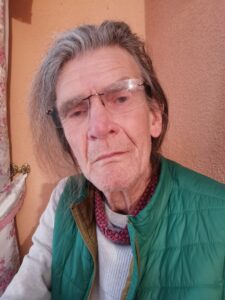
Robin Ouzman Hislop is Editor of Poetry Life and Times ; at Artvilla.com his publications include
All the Babble of the Souk , Cartoon Molecules and Next Arrivals, collected poems, & Moon selected Audio Textual Poems available at Amazon.com as well as translation of Guadalupe Grande´s La llave de niebla, as Key of Mist and the recently published Tesserae , a translation of Carmen Crespo´s Teselas.
You may visit Aquillrelle.com/Author Robin Ouzman Hislop about author. See Robin performing his work Performance (University of Leeds)
Tesserae Poem by Carmen Crespo Read By Robin Ouzman Hislop
Tesserae translated from the Spanish award winning Teselas by Carmen Crespo by Robin Ouzman Hislop & Amparo Arróspide, this is an audio version of the original translated text in Spanish & English, which can be purchased at Tesserae Carmen Crespo Amazon.com
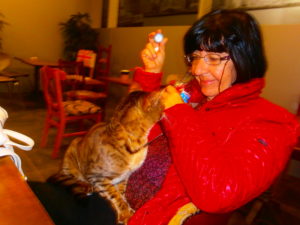
Amparo Arrospide (Argentina) is a Spanish poet and translator. She has published seven poetry collections, Mosaicos bajo la hiedra, Alucinación en dos actos algunos poemas, Pañuelos de usar y tirar, Presencia en el Misterio, En el Oido del Viento, Hormigas en Diáspora and Jaccuzzi, as well as poems, short stories and articles on literary and film criticism in anthologies and in both national and foreign magazines.
She has received numerous awards. Editor’s Note: see also Poetry, National Literature Prize 2018, Francisca Aguirre, Translated from Spanish by Amparo Arróspide & Robin Ouzman Hislop Her latest work Valle Tiétar is published by El sastre de Apollinaire Poesía,32 www.elsastredeapollinaire.com
Robin Ouzman Hislop is on line Editor at Poetry Life & Times at Artvilla.com. His numerous appearances include Cold Mountain Review (Appalachian University, N.Carolina), The Honest Ulsterman, Cratera No 3 and Aquillrelle’s Best. His publications are collected poems All the Babble of the Souk, Cartoon Molecules, Next Arrivals & Moon Selected Audio Textual Poems. A translation from Spanish of poems by Guadalupe Grande Key of Mist and Carmen Crespo Tesserae, the award winning (X111 Premio César Simón De Poesía), in November 2017 these works were presented in a live performance at The International Writer’s Conference hosted by the University of Leeds. UK. A forthcoming publication of collected poems Off the Menu is expected in 2020
You may visit Aquillrelle.com/Author Robin Ouzman Hislop about author. See Robin performing his work Performance (University of Leeds)
EL Cazador An Audio Poem by Amparo Arróspide with Piano Arrangement by D M Jackson

Dave M Jackson is the Admin at Artvilla.com where his works are featured extensively.

Amparo Arrospide (Argentina) is a Spanish poet and translator. She has published seven poetry collections, Mosaicos bajo la hiedra, Alucinación en dos actos algunos poemas, Pañuelos de usar y tirar, Presencia en el Misterio, En el Oido del Viento, Hormigas en Diáspora and Jaccuzzi, as well as poems, short stories and articles on literary and film criticism in anthologies and in both national and foreign magazines.
She has received numerous awards. Editor’s Note: see also Poetry, National Literature Prize 2018, Francisca Aguirre, Translated from Spanish by Amparo Arróspide & Robin Ouzman Hislop Her latest work Valle Tiétar is published by El sastre de Apollinaire Poesía,32 www.elsastredeapollinaire.com
Robin Hislop reads Amparo Arróspide’s Poem. Can’t All Poets. Arrangement by Dave Jackson. Guitar Andy Derryberry
Amparo Arróspide
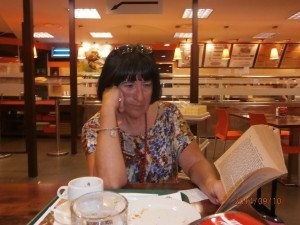
Amparo Arrospide (Argentina) is a Spanish poet and translator. She has published seven poetry collections, Mosaicos bajo la hiedra, Alucinación en dos actos algunos poemas, Pañuelos de usar y tirar, Presencia en el Misterio, En el Oido del Viento, Hormigas en Diáspora and Jaccuzzi, as well as poems, short stories and articles on literary and film criticism in anthologies and in both national and foreign magazines.
She has received numerous awards. Editor’s Note: see also Poetry, National Literature Prize 2018, Francisca Aguirre, Translated from Spanish by Amparo Arróspide & Robin Ouzman Hislop
Robin Ouzman Hislop is Editor of Poetry Life and Times ; his publications include
All the Babble of the Souk , Cartoon Molecules and Next Arrivals, collected poems, as well as translation of Guadalupe Grande´s La llave de niebla, as Key of Mist and the recently published Tesserae , a translation of Carmen Crespo´s Teselas.
You may visit Aquillrelle.com/Author Robin Ouzman Hislop about author. See Robin performing his work Performance (University of Leeds)
A Show. An Audio Textual Poem by Amparo Arróspide
A SHOW
You may see her
but not touch her
listen to her undulating hips
crave for her belly-button
and hope she lands flop on you lap
but she won´t
there’s glittering and sparkling,
the veils that she unveils
(mind you, not all all like removing the scales of a dragon
or plucking a hen)
her whispers, giggles, jewels
wax and wane
Yet don’t insects dance?
Could this girl be a mantis?
Or is she just an expert
hypnotist?
Cymbals, ear-rings, bracelets
to create suspense,
you may wonder and crave
but she won’t

Amparo Arrospide (Argentina) is a Spanish poet and translator. She has published seven poetry collections, Mosaicos bajo la hiedra, Alucinación en dos actos algunos poemas, Pañuelos de usar y tirar, Presencia en el Misterio, En el Oido del Viento, Hormigas en Diáspora and Jaccuzzi, as well as poems, short stories and articles on literary and film criticism in anthologies and in both national and foreign magazines.
She has received numerous awards. Editor’s Note: see also Poetry, National Literature Prize 2018, Francisca Aguirre, Translated from Spanish by Amparo Arróspide & Robin Ouzman Hislop
Robin Ouzman Hislop is Editor of Poetry Life and Times ; his publications include
All the Babble of the Souk , Cartoon Molecules and Next Arrivals, collected poems, as well as translation of Guadalupe Grande´s La llave de niebla, as Key of Mist and the recently published Tesserae , a translation of Carmen Crespo´s Teselas.
You may visit Aquillrelle.com/Author Robin Ouzman Hislop about author. See Robin performing his work Performance (University of Leeds)
The Hunter. Audio Text Poem by Amparo Arróspide Read by Robin Ouzman Hislop
The Hunter
(Villanelle)
Fear, a throbbing fear, as fiercely white
as the forest snow I roam while all sleep,
And over my tracking boots there was moonlight
Over my drunken steps, only her orbit
As white as anguished snow and the forked path
to the castle where my fate had been decreed:
“You will bring me her heart”
And looked at the moving distaff turn
–her face I couldn´t see, perhaps abominable–
And over my tracking boots there was moonlight
Over my drunken steps, only her orbit
How pale the child was, her heart in throbbing fear
As snow melted away for wolves and dens,
The forest snow I roam while all sleep,
And over my defeat now only moonlight
And over my drunken steps, only her orbit
Amparo Arróspide

Amparo Arrospide (Argentina) is a Spanish poet and translator. She has published seven poetry collections, Mosaicos bajo la hiedra, Alucinación en dos actos algunos poemas, Pañuelos de usar y tirar, Presencia en el Misterio, En el Oido del Viento, Hormigas en Diáspora and Jaccuzzi, as well as poems, short stories and articles on literary and film criticism in anthologies and in both national and foreign magazines.
She has received numerous awards. Editor’s Note: see also Poetry, National Literature Prize 2018, Francisca Aguirre, Translated from Spanish by Amparo Arróspide & Robin Ouzman Hislop
Robin Ouzman Hislop is Editor of Poetry Life and Times ; his publications include
All the Babble of the Souk , Cartoon Molecules and Next Arrivals, collected poems, as well as translation of Guadalupe Grande´s La llave de niebla, as Key of Mist and the recently published Tesserae , a translation of Carmen Crespo´s Teselas.
You may visit Aquillrelle.com/Author Robin Ouzman Hislop about author. See Robin performing his work Performance (University of Leeds)

